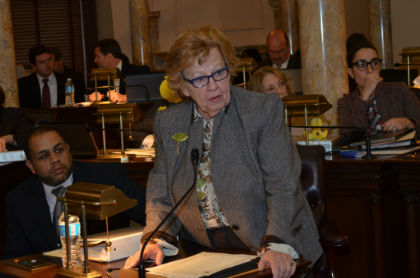
Bill Would Assist Wrongfully Convicted, Aid In Identifying True Perpetrator
TRENTON – Legislation sponsored by Senate Majority Leader Loretta Weinberg to enable more individuals charged with or convicted of crimes access to DNA analysis resources that would allow them to prove their innocence was approved today by the Senate Judiciary Committee. The bill is being championed by the Innocence Project, an organization dedicated to exonerating wrongfully convicted people through DNA testing and reforming the criminal justice system to prevent future injustice.
“We know that DNA testing has helped to exonerate wrongfully convicted people across the country and here in New Jersey,” said Senator Weinberg (D-Bergen). “Expanding access to DNA analysis to those who are no longer incarcerated will allow people who have served their time, but are still living with the nightmare of a wrongful conviction, to prove their innocence. This expansion will also assist in identifying the true perpetrators of the crimes for which these individuals were charged.”
There have been 316 DNA exonerations in the United States, including a number of cases in New Jersey. In one case, Rodney Roberts, of Newark, served seven years in prison for kidnapping and rape. He also faced indefinite civil commitment as a result of his conviction. Roberts was released in March 2014 after DNA testing established he could not have been the perpetrator of the crime for which he was convicted. Had Roberts not been in state custody, he would not have been eligible for post-conviction DNA testing to establish his innocence.
Under current state law, post-conviction DNA testing is only available to convicted individuals that remain incarcerated. The bill (S1365) would allow those who have been convicted but are not currently serving a prison term to petition the court for DNA testing. It would also expand state law pertaining to the use of DNA evidence in criminal matters to authorize courts to order law enforcement officials to submit crime scene evidence to the FBI’s Combined DNA Index System (CODIS) for a search to determine whether the evidence matches someone other than the defendant or the victim, either a known individual or a DNA profile obtained from an unsolved crime. CODIS is a database of DNA samples collected from offenders nationwide.
The bill would also establish a procedure to allow a defendant, or an individual already convicted of a crime, to request the upload of a forensic DNA analysis conducted by an accredited private lab to the national database. If an individual seeks to conduct DNA analysis at a private lab, he or she would bear the cost of the evaluation for certification of the lab required in order for samples to be eligible for uploading to the database. The private lab would not have direct access to the database.
“Expanded access will benefit those wrongfully convicted, but it will also aid crime victims and their families who in exoneration cases are often forced to relive the tragedies they experienced after learning the real perpetrator may still be free,” said Senator Weinberg. “The expansion of the use of DNA testing will assist in identifying the person who actually committed the crime, helping to provide closure to loved ones’ families while also protecting the public from further harm.”
In 153 of the nation’s 316 DNA exonerations, the real perpetrator was subsequently identified, often through the use of CODIS. In many instances, the person identified as the real perpetrator had gone on to commit additional crimes—totaling more than 30 murders and 70 sexual assaults—while the innocent person sat behind bars for a crime he or she did not commit.
The committee approved the bill unanimously. It now goes to the Senate Budget and Appropriations Committee for consideration.

